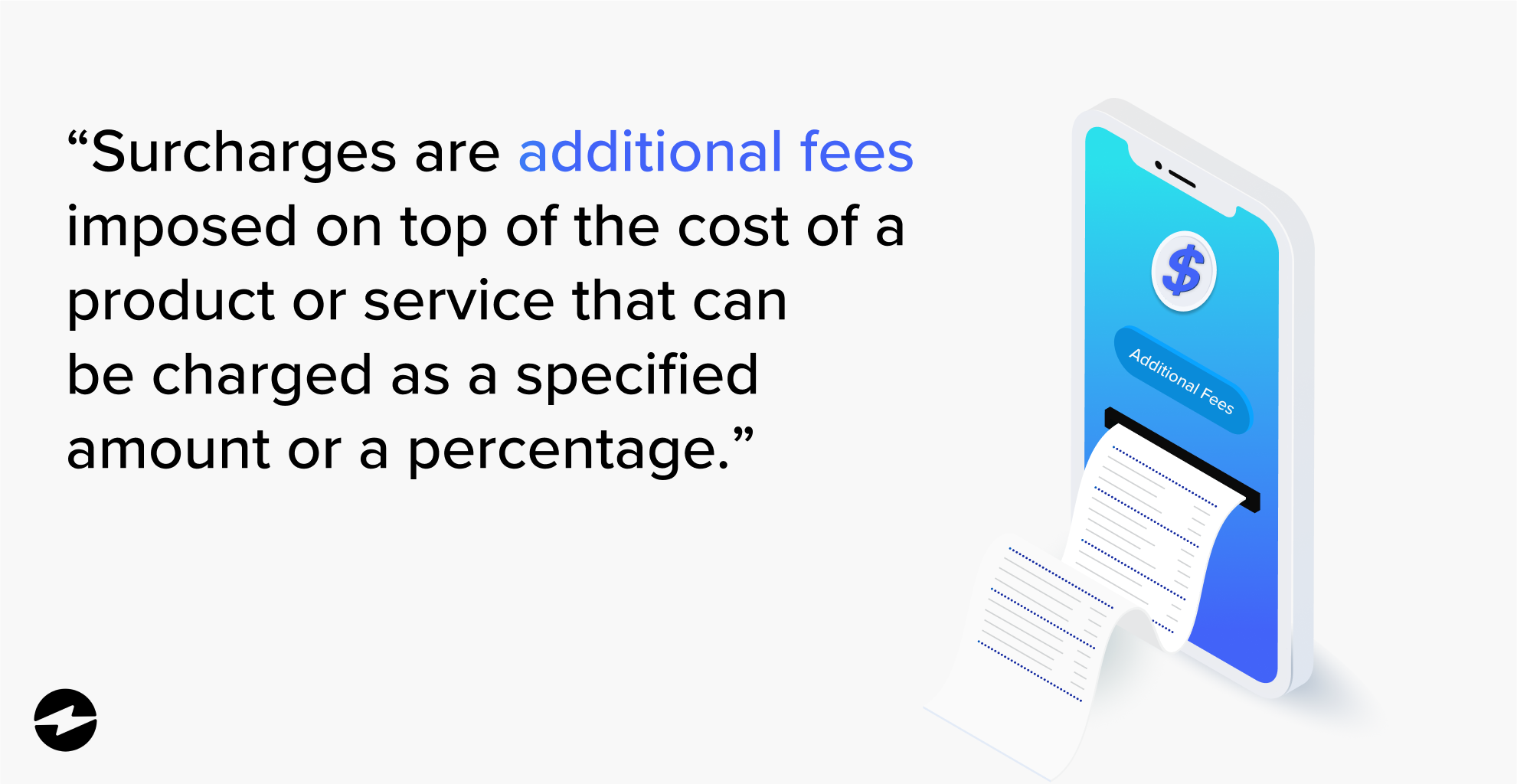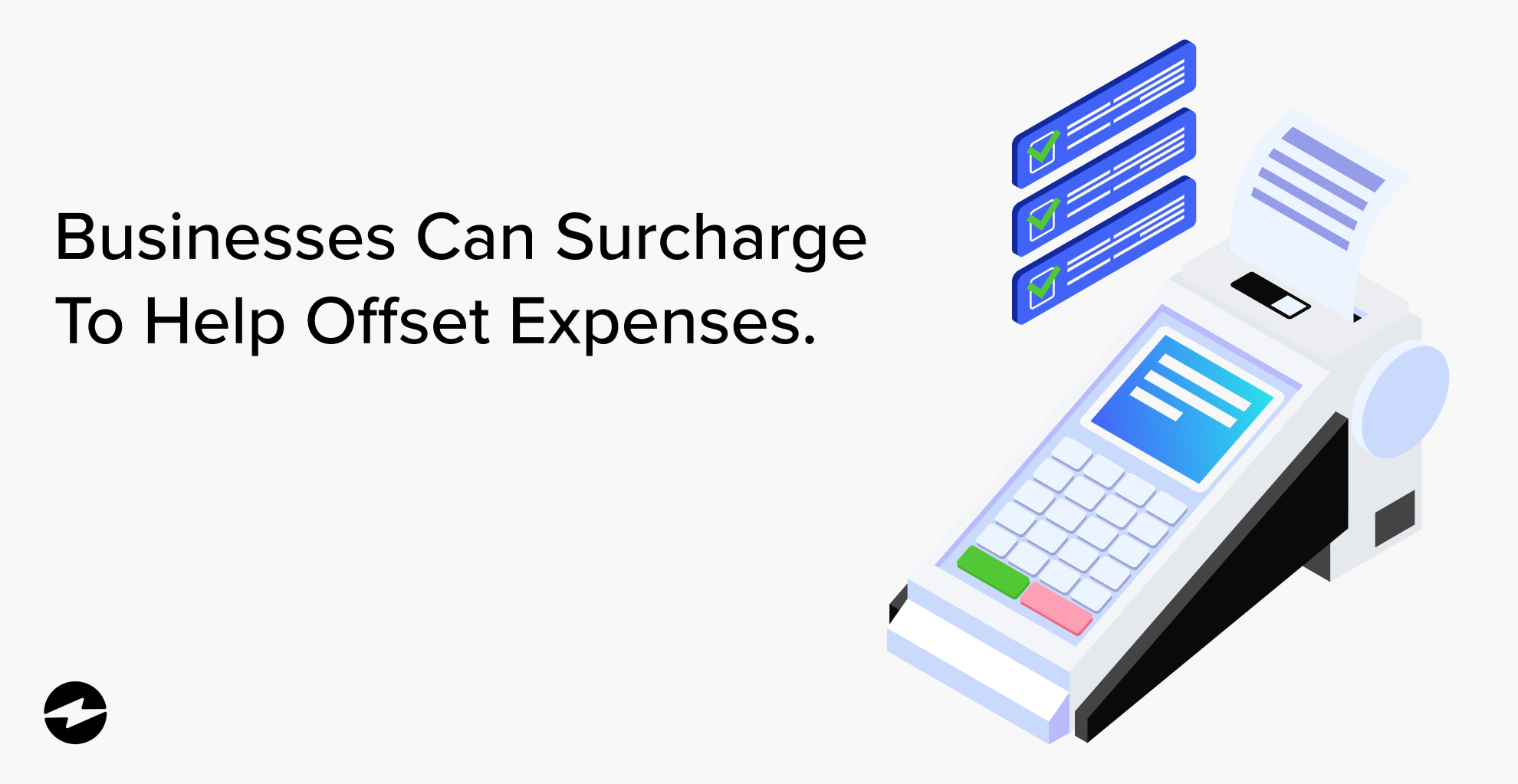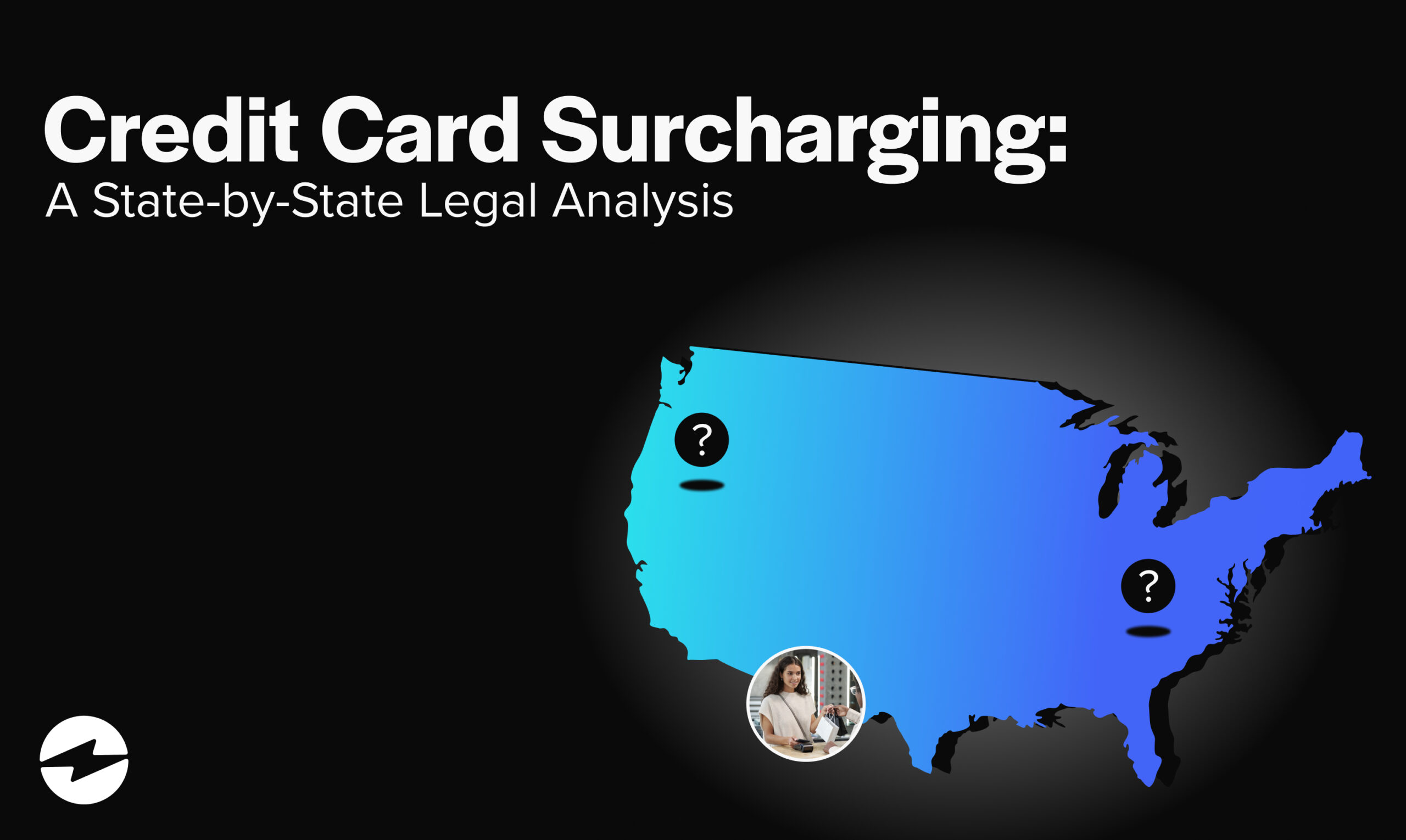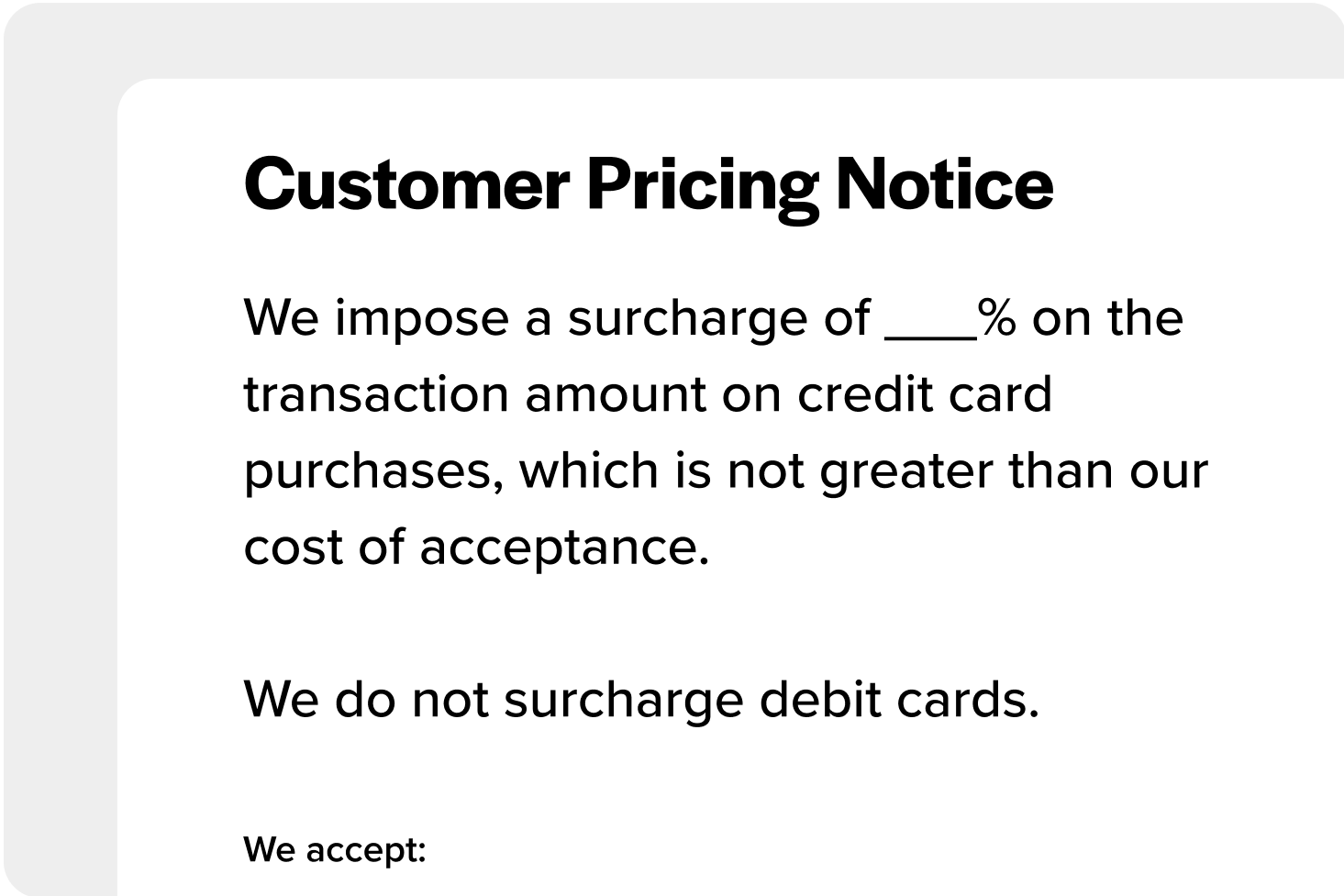Blog > Credit Card Surcharging: A State-by-State Legal Analysis
Credit Card Surcharging: A State-by-State Legal Analysis
As businesses strive to maintain profitability in the competitive commerce environment, surcharging is one strategy that’s garnered attention and controversy.
This article will dive into the legality of surcharging on state and federal levels to help merchants gain more insight into best practices and their impact on their businesses and consumers. It will also answer common questions, such as are credit card surcharges legal and is it illegal to surcharge debit cards.
What is credit card surcharging?
When you purchase with a credit card, the merchant’s financial institution processes the transaction and charges an interchange fee to the merchant for these services. However, the merchant isn’t always obligated to pay it. In some cases, merchants can pass these fees on to their customers as surcharges.
Surcharges are additional fees imposed on top of the cost of a product or service that can be charged as a specified amount or a percentage. Surcharges are commonly added to credit card transactions, utility bills, or transactions where the merchant is charged an interchange fee.
Merchants are prohibited from profiting from surcharges and can only charge the necessary amount to cover the cost of the interchange fee.
Surcharges are often confused with convenience fees since both can be applied to certain transactions, but there are some critical differences between the two.

What are the differences between convenience fees and surcharges?
Despite convenience fees and surcharges sharing several similarities, they differ in their purpose.
Convenience fees are added to the total amount of a transaction to provide convenient payment options to customers, often covering administrative costs, technological expenses, or third-party service fees.
For example, when customers order food online through a third-party delivery service, they’ll likely be charged a convenience fee for the convenience of browsing through menus, placing orders, and having meals delivered to their location. In this case, the convenience fee would cover the costs of delivery logistics and maintaining the platform.
Convenience fees are typically flat fees, meaning they won’t change based on a percentage of the transaction. Instead, they remain a set price added whenever alternative payment methods are used.
In contrast, surcharges can differ in price depending on the cost of the transaction. They can be fixed amounts but are often calculated as a percentage of the transaction value.
Surcharges are also associated with credit cards, whereas convenience fees tend to be associated with less traditional payment methods, including online payment platforms like Venmo and mobile wallets such as Apple Pay and Google Pay.
Surcharges are a topic of controversy since some consumers don’t feel they should have to cover processing costs. Considering this controversy, it’s important to be mindful of credit card surcharge rules and regulations.
Are credit card surcharges legal?
The permissibility of surcharging credit cards falls under the jurisdiction of individual states and card networks, as there are no federal restrictions on the practice. This means states can enact their own credit card surcharge laws as they see fit. Some states prohibit surcharging altogether, whereas others enforce various credit card surcharge regulations and restrictions.
In most states where surcharging practices are permitted, merchants must disclose their surcharging policies to customers. However, no federal regulations mandate the disclosure of surcharging amounts. Under the Expressions Hair Design vs. Schneiderman case, the Supreme Court ruled that requiring disclosure of surcharging amounts violates the first amendment and will therefore be left to individual states to determine their own disclosure practices. That said, most states that permit surcharging require this disclosure.
To understand credit card surcharge laws by state, businesses should consult their state legislature to stay up-to-date on updated credit card surcharge laws and restrictions, and they can also refer to this next section.
Credit card surcharge laws by state
Surcharging is legal in most states, with the exception of a few. Here is a complete list of states and jurisdictions that permit credit card surcharging as of 2025:
| Surcharge Legal States List | Surcharge Illegal States List |
|---|---|
| Alabama Alaska Arizona Arkansas Colorado Delaware Florida Georgia Hawaii Idaho Illinois Indiana Iowa Kansas Kentucky Louisiana Maryland Michigan Minnesota Mississippi Montana Nebraska Nevada New Hampshire New Jersey New Mexico New York North Carolina North Dakota Ohio Oklahoma Oregon Pennsylvania Rhode Island South Carolina South Dakota Tennessee Texas Utah Vermont Virginia Washington West Virginia Wisconsin Wyoming |
California Connecticut Maine Massachusetts Puerto Rico |
While most states permit credit card surcharging, several state-level governments vary in the surcharging regulations they impose.
Special considerations regarding state surcharging policies
Since states can create their own restrictions on surcharging practices, some legislatures take disclosing this information very seriously.
Maine and New York have implemented laws requiring merchants to provide customers with surcharging policy information. Merchants must display the cost of paying with cash versus the cost of paying with a credit or debit card for customers to clearly understand any additional charges they may incur when using cards.
Since merchants are prohibited from making a profit from surcharging, there’s a limit to how much can be charged on any given surcharge. Although the average maximum amount in the U.S. is capped at 4%, Colorado merchants can charge either 2% or the total amount of the processing fee.
With regulations that differ from state to state, the legal landscape of credit card surcharging can be tricky to navigate. Debit card surcharging, on the other hand, carries more concrete restrictions.
Is it legal to surcharge debit cards?
If credit card surcharging is illegal in your state, you may now find yourself asking what the debit card surcharge laws by state are. Under the Durbin Amendment of the Dodd-Frank Wall Street Reform and Consumer Protection Act, surcharges on debit cards are prohibited in the U.S.
The amendment outlines regulations related to interchange fees imposed by card networks, instituting a cap on these fees to regulate costs associated with debit card processing. In other words, this limits debit interchange rates imposed on merchants by reducing the overall costs of transaction fees on debit card transactions.
The rise of credit card surcharging
Although some negative connotations are associated with surcharging, they can yield financial benefits for merchants, such as no-fee credit card processing.
Surcharges can offset expenses related to processing transactions, so businesses with thin profit margins can save substantial funds to generate more revenue.
Implementing surcharges for credit cards can also incentivize customers to use lower-cost payment methods, lowering the average processing costs for merchants. By mitigating the impact of credit card processing fees, surcharging carries the potential to contribute to a merchant’s overall financial stability and profitability.

Applying surcharges to your credit card payments
With consideration of the legality of surcharging credit cards, merchants should be cautious when applying them to transactions. Before surcharging, you’ll first need to verify the state you’re operating in permits its use.
To help you ensure compliance with both state and federal surcharging laws, here’s a checklist to get started:
- Understand the legal landscape. With states retaining the ability to impose their own rules and regulations on surcharging, it’s imperative to stay up to date on the latest guidelines to ensure compliance.
- Determine suitable payment methods. When deciding which payment methods to offer, you should verify that surcharges can be added to these payments. Your business also must understand and follow the specific laws and restrictions that apply to surcharging in your region or jurisdiction.
- Calculate the surcharge amount. Whether surcharging on a flat fee or a percentage, you must ensure the amount is within the legal limits to avoid any overcharging penalties.
- Be transparent. Communicate surcharging information to maintain transparency and create a more honest relationship between you and your customers. This can be done by displaying the surcharge amount or percentage at the point of sale so your customers know what they’re being charged for.
- Comply with updated policies and procedures. Before implementing surcharging, businesses should update their policies and procedures to reflect these additional charges. You should also ensure all employees are aware of the surcharging guidelines and can communicate them effectively.
- Choose a compliant payment processor. When selecting a payment processor, you’ll need to confirm they support surcharging credit cards and operate within the legal standards of surcharging laws on the state level.
- Test and monitor functionality. Merchants should test payment processing systems to verify that surcharges are being applied correctly. Monitor these transactions and customer feedback to identify any issues or concerns.
You’ll also want to work with payment processors that fit the needs of your business and can guide you through the legal framework of surcharging to avoid any penalties.
Find the best payment processor to apply surcharging in your business
When looking for a payment processor, you should seek established and reputable credit card processing providers with expertise in surcharging. Given that it’s not standard practice, you must assess providers’ surcharging capabilities to verify their compliance with federal and state laws and regulations.
It’s important to remember that not all payment processors accept all forms of payment, so you’ll want to find a processor that accepts the payment methods that work best for your business to accommodate your customers.
Businesses can effectively navigate surcharging laws to optimize the payment process
Understanding the legal landscape of credit card surcharging is crucial for businesses and consumers alike. Compliance with disclosure requirements, limitations on charge amounts, and adherence to state-specific laws are essential to consider before implementing no fee credit card processing.
By navigating the complexities of surcharging regulations and using compliant payment processors like EBizCharge, your business can offset processing costs while maintaining transparency and fairness for consumers.
Frequently asked questions about surcharging
Frequently asked questions about surcharging
Summary
- What is credit card surcharging?
- What are the differences between convenience fees and surcharges?
- Are credit card surcharges legal?
- Credit card surcharge laws by state
- Is it legal to surcharge debit cards?
- The rise of credit card surcharging
- Applying surcharges to your credit card payments
- Find the best payment processor to apply surcharging in your business
- Businesses can effectively navigate surcharging laws to optimize the payment process
- Frequently asked questions about surcharging

